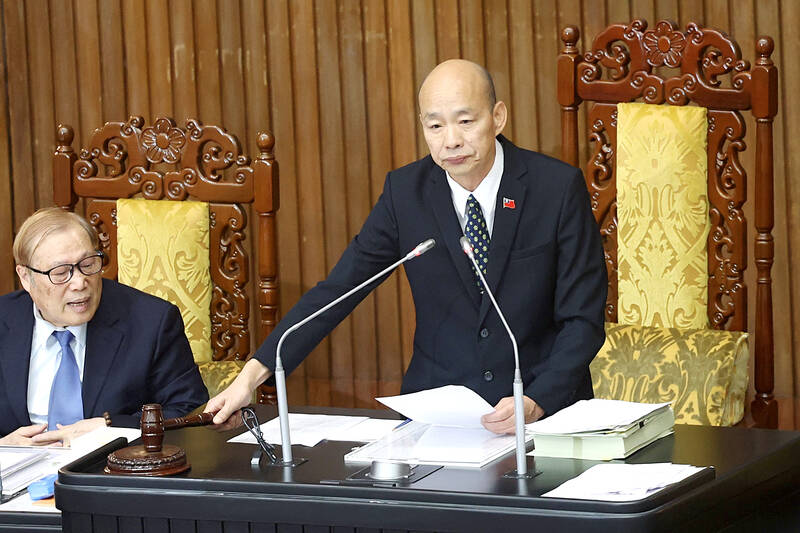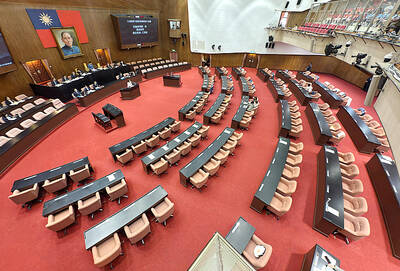The Legislative Yuan yesterday approved a NT$30,000 (US$1,002) monthly allowance for voluntary military service members and higher salaries for those in combat units, in a bid to boost flagging military recruitment and retention.
The Chinese Nationalist Party (KMT) caucus, which proposed the amendments to the Pay Act of the Armed Forces (軍人待遇條例), said that salaries must be raised to reflect increased frequency of duties and training, as well as boost recruitment incentives and retain top talent.
As rising cross-strait tensions have increased the workload of combat units, the bill introduces a new allowance to incentivize recruitment, the KMT caucus said.

Photo: CNA
The bill standardizes regional allowances by eliminating restrictions based on service category and rank, emphasizing instead that such allowances should be determined by the remoteness and inconvenience of the service location, the caucus said.
It also allows for overtime pay, so that if service members do not use all their leave, they can convert it into pay.
In addition, it stipulates that salaries should be appropriately adjusted so that military personnel’s income is not affected by inflation.
The bill, which passed its third reading, is set to go into effect from Jan. 1 next year.
Earlier yesterday morning, Premier Cho Jung-tai (卓榮泰) said that the bill contravenes the Budget Act (預算法) and the Constitution, and urged lawmakers not to “repeat the same mistakes” or the Executive Yuan would take action if necessary.
The Budget Act stipulates that if the Legislative Yuan introduces legislation that would significantly increase the annual expenditure of the central government, it must consult the Executive Yuan, he said.
The Taiwan People’s Party (TPP) caucus also held a news conference earlier yesterday to explain its version of the amendment, after it failed to reach a consensus with the KMT caucus on a consolidated bill.
TPP Legislator Lin Yi-chun (林憶君) said the military is struggling to recruit and retain people, and an increasing number of volunteer service members have been retiring.
About half of the early discharge applications are due to insufficient salary and benefits, she said, adding that all members of the TPP caucus agree that raising salaries is the fastest way to retain talent.
As the government plans to spend 3 percent of GDP on defense next year, the budget is sufficient to cover these raises, she said.
The TPP caucus’ proposal sought to increase and standardize compensation for volunteer soldiers, rather than instating a salary increase across the board.
Democratic Progressive Party (DPP) caucus chief executive Rosalia Wu (吳思瑤) accused the opposition alliance, which has a majority in the Legislative Yuan, of undercutting national defense spending while approving wage increases for the military.
The KMT is mandating that the government spend an additional NT$38.6 billion to increase the wages for the military, which could be unconstitutional, she said.
It is clear the KMT is doing everything it can to pander to the public and detract from the recall campaigns, she said.
The DPP government has increased military wages four times since it has been in power, compared with the one time that wages were increased under former president Ma Ying-jeou (馬英九), she added.
In other developments, the Legislative Yuan yesterday also passed an amendment extending tax breaks for energy-efficient appliances until Dec. 31, 2029, four days before they were due to expire.
Article 11-1 of the Commodity Tax Act (貨物稅條例) reduces taxes on new energy-efficient refrigerators, air-conditioners and dehumidifiers by NT$2,000 per unit.
The reduction was set to expire on Saturday, before lawmakers passed the amendment to keep it in effect.
The act only applies to new appliances that are classified as first or second-level energy efficient by the Ministry of Economic Affairs.

CROSS-STRAIT COLLABORATION: The new KMT chairwoman expressed interest in meeting the Chinese president from the start, but she’ll have to pay to get in Beijing allegedly agreed to let Chinese Nationalist Party (KMT) Chairwoman Cheng Li-wun (鄭麗文) meet with Chinese President Xi Jinping (習近平) around the Lunar New Year holiday next year on three conditions, including that the KMT block Taiwan’s arms purchases, a source said yesterday. Cheng has expressed interest in meeting Xi since she won the KMT’s chairmanship election in October. A source, speaking on condition of anonymity, said a consensus on a meeting was allegedly reached after two KMT vice chairmen visited China’s Taiwan Affairs Office Director Song Tao (宋濤) in China last month. Beijing allegedly gave the KMT three conditions it had to

‘BALANCE OF POWER’: Hegseth said that the US did not want to ‘strangle’ China, but to ensure that none of Washington’s allies would be vulnerable to military aggression Washington has no intention of changing the “status quo” in the Taiwan Strait, US Secretary of Defense Pete Hegseth said on Saturday, adding that one of the US military’s main priorities is to deter China “through strength, not through confrontation.” Speaking at the annual Reagan National Defense Forum in Simi Valley, California, Hegseth outlined the US Department of Defense’s priorities under US President Donald Trump. “First, defending the US homeland and our hemisphere. Second, deterring China through strength, not confrontation. Third, increased burden sharing for us, allies and partners. And fourth, supercharging the US defense industrial base,” he said. US-China relations under

The Chien Feng IV (勁蜂, Mighty Hornet) loitering munition is on track to enter flight tests next month in connection with potential adoption by Taiwanese and US armed forces, a government source said yesterday. The kamikaze drone, which boasts a range of 1,000km, debuted at the Taipei Aerospace and Defense Technology Exhibition in September, the official said on condition of anonymity. The Chungshan Institute of Science and Technology and US-based Kratos Defense jointly developed the platform by leveraging the engine and airframe of the latter’s MQM-178 Firejet target drone, they said. The uncrewed aerial vehicle is designed to utilize an artificial intelligence computer

The Chinese Nationalist Party (KMT) caucus yesterday decided to shelve proposed legislation that would give elected officials full control over their stipends, saying it would wait for a consensus to be reached before acting. KMT Legislator Chen Yu-jen (陳玉珍) last week proposed amendments to the Organic Act of the Legislative Yuan (立法院組織法) and the Regulations on Allowances for Elected Representatives and Subsidies for Village Chiefs (地方民意代表費用支給及村里長事務補助費補助條例), which would give legislators and councilors the freedom to use their allowances without providing invoices for reimbursement. The proposal immediately drew criticism, amid reports that several legislators face possible charges of embezzling fees intended to pay